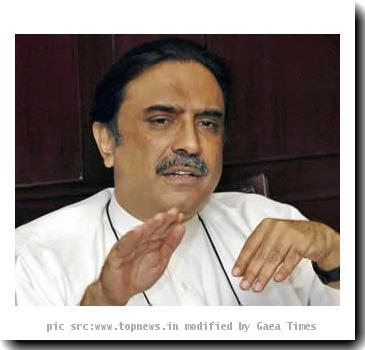Aide to Pakistan’s ex-president Musharraf calls UN report on Bhutto killing a ‘pack of lies’
By Munir Ahmed, APFriday, April 16, 2010
Musharraf aide calls UN’s Bhutto report ‘lies’
ISLAMABAD — A U.N. report on the assassination of former Prime Minister Benazir Bhutto is a “pack of lies” that wrongly implicates ex-President Pervez Musharraf and Pakistan’s security forces for not preventing her killing, an aide to Musharraf said Friday.
Bhutto was killed in a Dec. 27, 2007, gun and suicide-bomb attack as she was leaving a rally in Rawalpindi city, where she was campaigning to return her Pakistan People’s Party to power in elections after returning from nearly nine years in self-imposed exile.
The three-member U.N. panel said her death could have been avoided if Musharraf’s government and various security agencies had taken adequate measures. It also found that the probe into her death was deliberately hampered by intelligence agencies.
The Thursday report was hailed by the PPP, which now governs Pakistan and is led by President Asif Ali Zardari, Bhutto’s widower. Zardari aide Farahnaz Ispahani said “the report will pave the way for a proper police investigation and possible penal proceedings.”
Presidential spokesman Farhatullah Babar said the report backed up the PPP’s belief that Musharraf or his allies were responsible for Bhutto’s death. But Musharraf aide Rashid Qureshi insisted the U.N. report was based on rumors and that Musharraf was not responsible.
“This chief U.N. investigator was not the relative of Sherlock Homes,” Qureshi said.
He added that Bhutto exposed herself to the risk even after the head of the country’s most powerful spy agency, Inter-Services Intelligence, warned her not to attend the rally because of threats of an attack.
Musharraf’s government blamed Baitullah Mehsud, a Pakistani militant commander with reported links to al-Qaida. Officials at the U.S. Central Intelligence Agency also said Mehsud, who was killed in a missile strike last August, was the chief suspect.
The U.N. commission said Musharraf’s government, though tracking threats against Bhutto, did little more than pass them on to her and provincial authorities and did not act to neutralize them or ensure “that the security provided was commensurate with the threats.”
Bhutto’s party provided extra security, but the arrangements “lacked leadership and were inadequate and poorly executed,” it said.
“The Rawalpindi District Police’s actions and omissions in the immediate aftermath of the assassination of Ms. Bhutto, including the hosing down of the crime scene and failure to collect and preserve evidence, inflicted irreparable damage to the investigation,” the commission said. The decision to not conduct an autopsy made it impossible to determine a precise cause of death, it said.
While Bhutto was killed by a 15 1/2-year-old suicide bomber, “no one believes that this boy acted alone,” it said.
“Ms. Bhutto faced threats from a number of sources,” the commission said. “These included al-Qaida, the Taliban, local jihadi groups and potentially from elements in the Pakistani Establishment” — a reference to the country’s powerful military and intelligence apparatus.
The U.N. said the police probe lacked direction and commitment, and that it went after “lower level operatives,” not higher-ups.
The commission said Pakistan’s main spy agency, Inter-Services Intelligence, conducted parallel investigations, gathering evidence which was only selectively shared with the police.
“The commission believes that the failure of the police to investigate effectively Ms. Bhutto’s assassination was deliberate,” the report said. “These officials, in part fearing intelligence agencies’ involvement, were unsure of how vigorously they ought to pursue actions, which they knew, as professionals, they should have taken.”
Five people have been accused by authorities involvement in the assassination, but officials have said a final charge-sheet against them would only be submitted in court after the U.N. report was examined. A hearing was scheduled for April 21 for the five, jail official Mohammed Zafar said.
The commission urged Pakistani authorities to carry out a “serious, credible” criminal investigation that “determines who conceived, ordered and executed this heinous crime of historic proportions, and brings those responsible to justice.”
It also said “the autonomy, pervasive reach and clandestine role of intelligence agencies in Pakistani life underlie many of the problems, omissions and commissions set out in this report” and urged a thorough review of the intelligence agencies and reform within the police to better protect human rights.
The U.N. secretary-general agreed to appoint a commission to assist Pakistan by determining the facts and circumstances of Bhutto’s death and it began work on July 1, 2009, conducting more than 250 interviews and reviewing hundreds of documents, videos, photographs and documentary material.
Under terms agreed to by the U.N. and the Pakistani government, Pakistani authorities would determine any criminal responsibility.
Associated Press Writers Edith M. Lederer in New York and Chris Brummitt in Islamabad contributed to this report.
Tags: Asia, Asif Ali Zardari, Criminal Investigations, Intelligence Agencies, Islamabad, Pakistan, South Asia, Terrorism, Violent Crime

